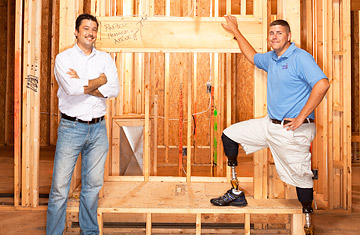
(2 of 5)
The returning veterans are bringing skills that seem to be on the wane in American society, qualities we really need now: crisp decisionmaking, rigor, optimism, entrepreneurial creativity, a larger sense of purpose and real patriotism (as opposed to self-righteous flag waving). Indeed, the wars in Iraq and Afghanistan required a new military skill set, far more sophisticated than for previous conflicts — and far different from the yes-sir, no-sir rote discipline that most civilians associate with the military. "World War I was fought by large units like battalions," says John Nagl, a former Army officer who is chairman of the Center for a New American Security (CNAS), a Washington think tank almost entirely staffed by this new generation of veterans. "World War II was fought by companies. Vietnam, by platoons. The current wars are all about small teams who have to interact with the local Iraqi and Afghan populations. That has required a different kind of soldier."
I first noticed this when I embedded with a company of the 4th Infantry Division in the town of Senjaray, in a Taliban-controlled area of southern Afghanistan. The company commander, Captain Jeremiah Ellis, essentially became the mayor of the town — dealing with the local shura (council of elders), providing security, asking the public about the kinds of development projects they wanted, funding those projects through his CERP (commander's emergency-response program) money. It occurred to me that Ellis had developed the political skills to be the mayor of his hometown in Iowa or, eventually, the governor of that state. Ellis and his First Sergeant Jack Robison later showed their entrepreneurial creativity in another way: worried that their troops might succumb to the violence that was afflicting other soldiers when they returned from a deployment, they organized a three-day Outward Bound program back at Fort Carson in Colorado — rock climbing, white-water rafting and adventure races — to take the edge off a very difficult year in Senjaray. Ellis invited in therapists from his alma mater, the University of New Hampshire, as well as from the Army, to get the soldiers talking about their anger and their fears. "When we rotate home, we work on fixing up every piece of equipment except their brains," Ellis says. "Had to do something about that."
The Pentagon is rightly worried that many of its best young leaders, especially captains like Ellis, are leaving the service after multiple tours in war zones. But the military's brain drain is civilian America's gain: "These soldiers had to rebuild communities and make difficult decisions under huge pressure," says General David Petraeus, whose revamped training procedures helped create this force. "They've had to show incredible flexibility, never knowing whether they're going to be greeted with a handshake or a hand grenade. They've been exposed to experiences that are totally unique, compared with most Americans. Once they've seen the elephant, they surely can help rebuild Joplin. I believe they are our next great generation of leaders."
And Petraeus, in many ways, is their spiritual father. He has surrounded himself with military intellectuals from the service academies, like Liz McNally, a tiny West Point graduate and Rhodes scholar who did a tour in Baghdad at the age of 24, running a platoon of military police officers, and later became the general's speech writer. Or Seth Moulton, a Marine captain who had been the Harvard class-of-2001 commencement speaker and became particularly adept at working with Iraqis to organize construction projects. "Petraeus was an amazing boss," Moulton says. "Our mission was to defeat the military bureaucracy. We were able to build border forts, using Iraqi engineers and work crews, for one-fifth the price that the American contractors were charging and in one-third the time. Our proposals went right to his desk, rather than through the bureaucracy. The only thing he demanded of us was success."
Moulton, McNally and other activist veterans have stayed in touch since leaving the service. After years of watching them in action downrange and back home, I can pretty much spot them on sight: fit, smart, confident and strong. They look you straight in the eye when they talk; they can be funny as hell, but their language isn't fancy. "There's a special bond among those of us who came from privileged educational backgrounds and chose to serve," says Moulton. "We're a group that really wants to see America become a better place. We hate the divisive politics of the baby-boom generation. They're running the country into the ground." That's another lovely thing about these veterans: they don't mince words.
The First Mission: Taking Care of One Another
Paul Rieckhoff was one of the first home from Iraq in January 2004, and he came home angry. He was an Army National Guard officer with a degree from Amherst College. He had spent much of his tour in a tough neighborhood in Baghdad, watching as his troops were killed or wounded because they didn't have proper body armor or were driving around in open humvees. Soon after he came home, a member of his unit committed suicide. "There was all this stuff going on, and no one was speaking for the troops," Rieckhoff says. "It was amazing and disgusting. No one was lobbying for them." He and another vet set up a website, Operation Truth, which became a message center for returning vets — and he ultimately formed Iraq and Afghanistan Veterans of America (IAVA), which remains the most important organization representing the new generation of veterans.
